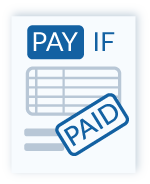
Continuing our brief review of pay-when-paid and pay-if-paid clauses throughout the United States, this post examines these clauses under Colorado construction law. Colorado allows for both the timing mechanism of a pay-when-paid clause, and the burden-shifting of a pay-if-paid clause. Note, however, that if the desired effect of the clause is to shift the burden of the risk of non-payment to the subcontractor, the language must be precise.
Distinction between pay-if-paid and pay-when-paid in Colorado

A pay-when-paid clause is not a contingency, but rather means that payment may be delayed … A “pay-if-paid” clause … excuses the general contractor’s obligation to the subcontractor if the owner does not pay.
In this case, the defendant, Printz Services Corporation (Printz) was hired as to act as general contractor for a casino construction project in Cripple Creek. Printz later hired C.J. Masonry (C.J.), amongst others, as a subcontractor on the project. The contract between Printz and C.J. contained the following clause:
Contractor shall make final payment to Subcontractor after work is complete and accepted by Owner and Architect provided like payment shall have been made by Owner to Contractor….
Unfortunately, the property owner eventually went insolvent and the project was sold in foreclosure. As a result, Printz was never paid, and, as could be expected, neither did the subcontractors. C.J. then sued Printz for breach of contract.
By ultimately ruling that C.J. was entitled to be paid by Printz, the court determined that the above clause was not the “pay-if-paid” clause that Printz argued it was, but rather, was a pay-when-paid clause that merely worked to delay payment, not excuse it all together. The court held that the owner’s insolvency and subsequent failure to pay Printz did not “absolve Printz of its duty to pay C.J. …”
Download a free 50-State Guide to Pay-When-Paid and Pay-if-Paid Construction Contracts
Pay-if-paid clauses must be specific & precise to be enforceable
In some states, like California and others, the wording of a pay-if-paid or pay-when-paid clause, and the distinction between them, is unimportant because both are unenforceable. In Colorado, though, where “when” clauses do not shift the risk of owner nonpayment from the contractor to the subcontractor but “if” clauses do, the distinction is crucial. So, since Colorado allows the burden of owner-non payment to be shifted to subcontractors in some circumstances, how is that burden-shifting achieved?
Colorado allows for both the timing mechanism of a pay-when-paid clause, and the burden-shifting of a pay-if-paid clause.
The answer to that question, just like many answers in the law, is to be precise with the language of the contract provision at issue. Since the law generally disfavors burden-shifting provisions, (pay-if-paid clauses are no exception and are generally given strict scrutiny by the courts), very specific language must be used if the provision is to be upheld. This can be a huge benefit to subcontractors, because many general contractors do not take the time to double and triple check their contractual language, and incorrectly assume their sloppy pay-if-paid clause will shift the burden of non-payment to their subs.
In Colorado, like many other states, this is not the case. If the pay-if-paid clause is sloppily written, or not specific, or doesn’t contain some form of the proper language, the court will interpret the clause as a pay-when-paid clause – that is, a timing mechanism, not a “get out of payment free” card. One of the commonly overlooked aspects of “pay when paid” and “pay-if-paid” litigation is whether a contractual provision fits more into the “when” or “if” category.
In Colorado, to be enforced as a pay-if-paid clause, the provision must clearly and expressly state that:
- The payment of the prime contractor by the owner is a “condition precedent” to the prime paying his subs, and the prime contractor is only obligated to pay the sub if the prime is first paid by the owner, and;
- The subcontractor understands and accepts the “shifting of the risk” of owner non-payment such that if the owner does not pay the prime, the prime has no obligation to pay the sub.
As mentioned above courts generally disfavor such provisions. In order to be enforced the clause must contain the above language, and indicate that the subcontractor both understood and accepted the risk-shifting.
Conclusion
Both pay when paid and pay-if-paid clauses are enforceable in Colorado construction contracts. Pay-when-paid clauses act as timing mechanisms for payment, and pay-if-paid clauses can shift the burden of non-payment to the subcontractor. That being said, pay-if-paid clauses are generally disfavored, are strictly reviewed, and must contain certain specific language in order to be enforceable.
The take-away is this. Burden-shifting via a pay-if-paid clause is possible in Colorado, but the precise nature of the language required may provide a subcontractor with a good argument to have a pay-if-paid clause held unenforceable.
